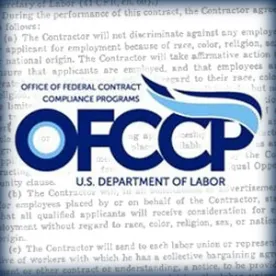OFCCP has announced a proposal to rescind the Trump-era final rule “Implementing Legal Requirements Regarding the Equal Opportunity Clause’s Religious Exemption”. As described in the Proposal:
OFCCP’s proposed rescission would preserve the EO 11246 religious exemption, which would still be available to qualifying contractors. This rescission would ensure that the EO 11246 religious exemption is interpreted and applied consistent with Title VII principles and case law. Rescinding this rule would have the effect of returning Department policy and practices to those that were operative during the presidencies of George W. Bush and Barack Obama.
Dating to 2017, the administration of former President Trump took steps to ensure the religious freedoms of employers in the face of what the administration perceived as curtailments of those freedoms, including by OFCCP. Those efforts culminated in the final Rule to clarify the contours of the EO 11246 religious exemption. At the time, OFCCP specifically stated that the Rule was “intended to correct any misperception that religious organizations are disfavored in government contracting by setting forth appropriate protections for their autonomy to hire employees who will further their religious missions, thereby providing clarity that may expand the eligible pool of federal contractors and subcontractors.”
About a month later, OFCCP issued an Opinion Letter providing insights on “six possible religious discrimination scenarios.”
As a reminder, federal contractors are prohibited from discriminating based on religion and national origin and must provide appropriate religious accommodations, absent undue hardship. 41 C.F.R. 60-50.2. However, these regulations are subject to limits:
-
The Exemption excludes any contractor or subcontractor that is a religious corporation, association, educational institution, or society regarding the employment of individuals of a particular religion;
-
The Religious Freedom Restoration Act(RFRA) may require an exemption or accommodation for a contractor under EO 11246; and
-
The First Amendment ministerial exception bars employment discrimination suits on behalf of employees who work at religious institutions in positions deemed to be “ministerial.”
Based on the Proposal and a DOL Blog post, it is fair to say that OFCCP under Director Jenny Yang believes that the prior administration’s Rule went too far by attempting to codify interpretations of the Exemption that are inconsistent with Title VII case law. In summary, OFCCP’s Proposal identifies three bases for rescission of the Rule:
-
Religious Employer Test. The Proposal and Blog argue that the Rule goes too far in allowing organizations to qualify for the Exemption:
The [Rule] permits a contractor whose purpose and/or character is not primarily religious to qualify for the Executive Order 11246 religious exemption.
That [Rule] adopted new standards at odds with the weight of relevant case law, including Title VII case law. For example, in determining which entities are eligible for the religious exemption, Title VII case law has overwhelmingly held that the ultimate inquiry focuses on whether the employer’s purpose and character are primarily religious – a determination typically made by weighing multiple factors. The [Rule] departed from that approach. Under the proposal, OFCCP would return to following this authority.
-
Exemption of Unlawful Employment Actions. Here, OFCCP’s Proposal argues that the Rule impermissibly allows qualifying religious federal contractors to discriminate if “motivated ‘solely’ by its sincerely held religious tenets, even when the contractor’s actions violate another nondiscrimination prohibition of Executive Order 11246 (other than race…).”
The [Rule’s] definition of ‘particular religion’ authorizes the contractor to require, as a condition of employment, the applicant’s or employee’s ‘acceptance of or adherence to sincere religious tenets as understood by the employer.’ … The weight of Title VII case law reflects that qualifying religious employers generally may make decisions about whether to employ individuals based on acceptance of and adherence to religious tenets, as long as those decisions do not violate the other nondiscrimination provisions of Title VII, apart from the prohibition on religious discrimination
-
Categorical Approach to RFRA Analysis. OFCCP’s Proposal asserts that the Rule stands the RFRA on its head by elevating religious interests over all other protected statuses. “[The] RFRA provides that when application of a federal government rule or other law would substantially burden a person’s exercise of religion, the government must afford that person an exemption to the rule unless it can demonstrate that applying the burden to that person furthers a compelling governmental interest and is the least restrictive means of doing so.”
The [Rule], however, announced that OFCCP “has less than a compelling interest in enforcing E.O. 11246 when a religious organization takes employment action solely on the basis of sincerely held religious tenets that also implicate a protected classification, other than race.” The preamble repeatedly mentioned marriage and sexual intimacy as likely subjects of such religious beliefs requiring accommodation … suggesting that protection from discrimination on the bases of sex, sexual orientation, and gender identity, in particular, could be compromised under this analysis. Executive Order 11246, however, lists all the protected bases on equal terms, making no distinction among them.





 />i
/>i

